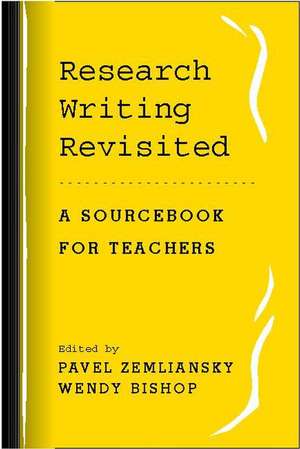Research Writing Revisited: A Sourcebook for Teachers
Editat de Pavel Zemliansky, Wendy Bishopen Limba Engleză Paperback – 31 aug 2004 – vârsta de la 18 până la 21 ani
It's no wonder that students resist the conventional research paper and that teachers burn out on its routines; its formal, stodgy, and rigidly academic boundaries allow for little deviation or creative expression. Indeed, the time has come to brush the dust off research-writing pedagogy and reimagine it into the twenty-first century classroom with fresh approaches that breathe life into both the papers themselves and the instruction that supports them.
In "Research Writing Revisited" educators will find the alternatives they've been looking for to teach the research paper anew. Zemliansky and Bishop have not only gathered innovative teachers to present a book full of successful and engaging research-writing alternatives, they've also asked them to plumb their file drawers and pull out assignment descriptions, syllabi, rubrics, and student examples that illustrate exactly how their ideas and assignments look and feel in practice. Best yet, these useful, authentic teaching tools are available for download on the book's companion website www.boyntoncook.com/researchwritingrevisited.
With the variety of assignments in Research Writing Revisited and the documentation available at its online companion, you'll have everything you need to resituate the research paper for your students and yourself. Turn away from academic summarization and compilation and toward contemporary, energetic, multifaceted, multimedia activities that result in satisfying writings of different genres, formats, and purposes. Read "Research Writing Revisited" and think outside the research-paper box.
Preț: 375.00 lei
Nou
71.79€ • 73.83$ • 59.56£
Carte indisponibilă temporar
Specificații
ISBN-10: 0867095555
Pagini: 231
Dimensiuni: 153 x 233 x 13 mm
Greutate: 0.33 kg
Editura: Boynton/Cook Publishers
Descriere
In Research Writing Revisited educators will find the alternatives they've been looking for to teach the research paper anew. Zemliansky and Bishop have not only gathered innovative teachers to present a book full of successful and engaging research-writing alternatives, they've also asked them to plumb their file drawers and pull out assignment descriptions, syllabi, rubrics, and student examples that illustrate exactly how their ideas and assignments look and feel in practice. Best yet, these useful, authentic teaching tools are available for download on the book's companion website www.boyntoncook.com/researchwritingrevisited.
With the variety of assignments in Research Writing Revisited and the documentation available at its online companion, you'll have everything you need to resituate the research paper for your students and yourself. Turn away from academic summarization and compilation and toward contemporary, energetic, multifaceted, multimedia activities that result in satisfying writings of different genres, formats, and purposes. Read Research Writing Revisited and think outside the research-paper box.
Cuprins
Acknowledgments
Research as Empowerment
Chapter 1: Developing "Interesting Thoughts": Reading for Research, Janette Martin
Chapter 2: Rhetorically Writing and Reading Researched Arguments, Maureen Daly Goggin and Duane Roen
Research as Art and Self-Expression
Chapter 3: Creative Research for All Writers, Wendy Bishop
Chapter 4: Scratching a "Marvelously Itchy" Itch: Teaching the I-Search Paper, Tom Reigstad
Chapter 5: Researching Like a Writer: The Personal Essay as Research Paper, Paul Heilker , Sarah Allen , and Emily Lewis
Research Across Genres, Disciplines, and Settings
Chapter 6: More Than Just Writing about Me? Linking Self and Other in the Ethnographic Essay, Bonnie Sunstein and Elizabeth Chiseri-Strater
Chapter 7: A Pinata of Theory and Autobiography: Research Writing Breaks Open Academe, Mark Shadl e and Rob Davis
Chapter 8: Working Together: Teaching Collaborative Research to Professional Writing Students, Joyce Magnotto Neff
Chapter 9: Developing a New Generation of Scholars: "Search and Re-Search" Reader Response and Writing in the Literature Classroom, Georgia A. Newman
Research as Collaboration and Service to the Community
Chapter 10: Agents of Change, Catherine Gabor and Carrie Leverenz
Chapter 11: Moving Writing Out of the Classroom: An Appeal for Community Literacy Composition Pedagogies, Kenneth Wright
Chapter 12: The Half-Life of the Classroom: Students as Public Agents, Lisa Bickmore and Stephen Ruffus
Research as Process
Chapter 13: Editing: Students' (and Teachers') Least Favorite Part of the Research Writing Process, Deborah Coxwell-Teague
Chapter 14: Citation as Speech Act: Exploring the Pragmatics of Reference, Chris M. Anson
Chapter 15: Assessing Research Writing, Traci Pipkins and Jim Zimmerman
